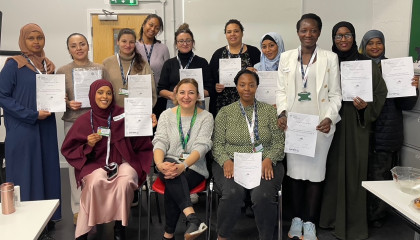You are here: Quality shortcuts don't lead to a working childcare system
Research published today by the Family and Childcare Trust reveals significant concerns about how the upcoming extension to free childcare could impact on the provision of quality early education. No Shortcuts: quality and the free childcare extension, funded by Community Playthings, shows that many families will welcome additional free childcare. However, providers, parents and local authorities are concerned that the policy change could mean that less childcare is available, that it might diminish the quality of care, and that settings could find it harder to cater for children with special educational needs and disabilities (SEND).
This September, working parents of three and four year olds across England will be entitled to 30 hours per week of free childcare during school term time. This doubles the current allowance for eligible families, and as such, represents a major change to the way childcare and early education is provided.
High quality early education has a fundamental impact on children, supporting their social, emotional and cognitive development so they are ready to do well at school. Research shows that access to high quality childcare can boost children’s GCSE achievement by an additional eight grades. There are also benefits for wider society. Quality childcare can narrow the gap in outcomes between disadvantaged children and their more affluent peers. Though the importance of quality childcare is widely recognised, there is limited evidence that full time childcare is any better or worse for children’s outcomes than part-time.
To find out more about the potential effects of the 30 hour offer on quality, we spoke to people who use and deliver childcare on a daily basis across England. We conducted a series of focus groups with parents, and interviews with childcare providers and local authority early years teams, to explore what these groups felt were key conditions for quality, and how these priorities could be affected by the 30 hour offer.
Parents highlighted the potential of the 30 hour extension to improve family life by easing pressures on time and money, but our discussions also raised a number of serious concerns. These include reduced availability of local childcare because of fewer children attending for longer, and additional funding pressures if the amount paid by Government does not reflect the real cost of delivering care. As one provider said, “that gap is the difference between a basic standard of care, and what resembles quality”.
Our interviewees were concerned that the policy could compromise the aspects of childcare quality which mattered to them most. The quality and availability of provision for disadvantaged children, and those with SEND, was regarded as being at particularly high risk.
Ofsted ratings suggest that the quality of early years settings has improved in recent years. However, there is still a long way to go. In 2015, some 210,000 children were in settings rated less than ‘good’, and poorer quality settings are more likely to be found in deprived areas.
It is vital that raising quality for all children continues to be a priority, and is not compromised by the 30 hour offer. The Government must make sure that the challenges identified in this report do not prevent any child from accessing high quality early education, particularly those who need it most.
We are calling on the Government to:
- Commit to an annual review of funding levels for early education informed by evidence gathered with local authorities on the cost of delivering high quality early education across the country.
- Improve access to early education for children with SEND by equalising inclusion requirements between PVI and maintained providers and through statutory guidance on Inclusion Funds.
- Provide clearer guidance to providers on delivering the 30 hour offer including on charges to parents for additional hours, activities and services.
- Clarify, strengthen and fund the strategic role of local authorities in improving the quality of early education and in closing the gap in achievement between disadvantaged children and their peers in the early years.
- Undertake an evaluation of the roll out of the 30 hour offer that measures: the effect on parental employment levels; the achievement gap between disadvantaged children and their peers; uptake of early education by children with SEND; uptake of early education by disadvantaged two year olds; costs of childcare outside the free entitlement; and sufficiency of local provision for early years childcare and the free entitlement.
- We also want to see Ofsted collect a richer range of quality metrics as part of the inspection process, including staff qualifications, turnover and retention rates to make inspection reports more meaningful for parents.
More from our blog
Sign up to our newsletter
Get the latest news, research and resources from Coram Family and Childcare




